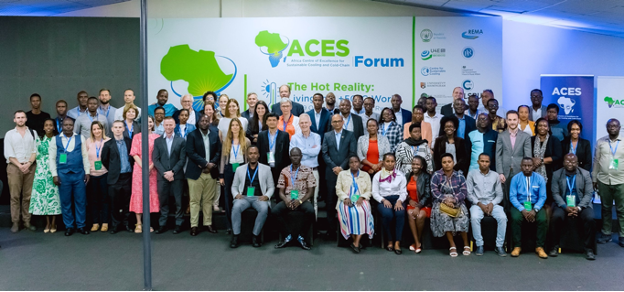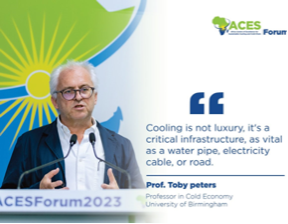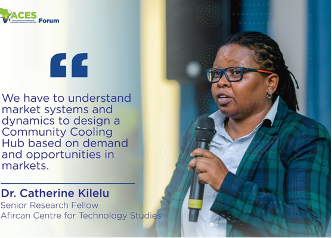Authors: Dr. Dorcas Kalele, Isaiah Omolo, Dr. Catherine Kilelu
Background
According to the Food and Agriculture Organization of the United Nations, every year, about 1.3 billion tonnes of food are lost or wasted across the food supply chain. It’s estimated that 40% of total food produced in Africa is lost between production & consumption due to lack of effective refrigeration, which accounts for millions of tons of annual food loss. At the same time, 1 in 10 people globally remain malnourished. Apparently, the scale of food loss and waste not only causes harm to human health but also to economies, businesses, consumers, and the environment. As a fact, the production of this wasted food uses natural resources (land, water, fertilizers etc.) and contributes to climate change, accounting for approximately 8%-10% of global greenhouse gases emissions (GHGs), by emitting methane into the atmosphere.
The UN’s Sustainable Development Goals (SDGs) together with climate change commitments, The Paris Agreement (2015), provide clear strategies and efficient means to improve food security and sustainability by 2030. Specifically, one of the key targets in the ‘SDG 12’ calls for countries to reduce their ecological footprint by changing the way they produce and consume goods and resources. The target calls for countries to half per capita global food waste at the retail and consumer levels as well as reduce food losses along production and supply chains by 2030. To achieve the target, it is imperative that countries strive to introduce technologies and innovative solutions, together with good production and processing practices that serve to manage food quality and reduce food loss. Apparently, realization of the ‘SDG 2’ ‘Zero Hunger’ remains a global challenge and is further compounded by the impacts of climate change on food systems. It is thus essential to plunge into the scope of these challenges and the global benefits of reducing food loss and waste, while thinking of sustainable solutions at the individual, local, national and global level.
The ‘Groundbreaking’ ACES
The need to develop innovative, game changing solutions for sustainable cold chain in Africa birthed the Africa Centre for Excellence for Sustainable Cooling and Cold-chain (ACES). ACES is a unique integrated Centre of Excellence established in 2020 by the Governments of the United Kingdom (UK) and Rwanda, The Centre for Sustainable Cooling (UK), United Nations Environment Programme (UNEP), United for Efficiency (U4E) initiative and the University of Rwanda (UR). Academic partners include the University of Birmingham, Cranfield University, London South Bank University, Heriot-Watt University, and Wageningen University. ACES brings together a world-leading collaboration between governments, academics, industrial partners, stakeholders, and non-governmental organizations (NGOs) to develop and accelerate the uptake of sustainable, smart cold chain and cooling solutions in the agriculture, dairy, fisheries, and health sectors throughout Africa. The Centre is focused on the productive use of energy, taking a needs-driven, system-level approach to economically empower farmers, increase export revenues, enhance job creations in rural areas, ensure food and energy security, improve vaccine and pharma supply chains, mitigate climate and environment impacts of cooling technologies and food loss, and foster resilient low-carbon development.
‘HUB’ and ‘SPOKE’ MODEL
ACES will serve as the hub for a network of Specialized Outreach and Knowledge Establishments (SPOKEs) across Africa to showcase how solutions can be deployed in practical, real-world applications and provide the on-site and outreach learning, training and knowledge transfer and technical assistance centers to support local community uptake. It will provide an avenue to demonstrate and implement proven solutions and business models, delivering economic security for marginal farmers while accelerating the transition to low/zero carbon and climate neutral cold-chain and cooling. The first SPOKE model is being developed in Kenya by the African Centre for Technology Studies (ACTS) with aim to develop and disseminate expertise on resilient cooling and cold-chain solutions with further SPOKEs being planned in other countries within Africa. SPOKEs will run a novel “Try Before You Buy” initiative, to be set-up and operated by ACTS, to engage the farmer communities and co-operatives, enabling them to experience the value of cold-chain (through improved quality and market connectivity) and helping them develop robust business models.
ACES Forum 2023
ACES held a landmark 2-day Forum at the ACES Institute Rubirizi Campus, Kigali, Rwanda on 17th -18th October. The Forum featuring experts from governments, research and academia, non-profit organizations, and private sectors, provided an incredible platform to navigate the cold chain space and explore the World’s First Cold Chain Campus, new facilities under development, Refrigeration Training Centre, Sustainable cold-chain training and graduate programs and a Smart-Farm Initiative. The Forum gave the stakeholders a chance for deep-dive discussions, insights, and networking opportunities. It also provided an opportunity for learning and knowledge exchange with highlights from the progress with ACES, SPOKEs and forge mechanisms for further works, collaboration, and engagement in the space of creating dynamic opportunities for guiding the future of cooling and cold chain systems in Africa and beyond.

Key highlights from the Forum
 |
High profile keynote addresses were made by several stakeholders during the plenary sessions and the breakout discussions featuring industry experts, some of which are outlined here; in his opening remarks, Prof. Toby Peters, Professor in Cold Economy, University of Birmingham stated that “Cooling is not a luxury, rather it's a necessity, a critical infrastructure as vital as a water pipe, electricity cable or a road”. Indeed, this proofs the fact that cold-chain system is vital for a well-functioning society and economy since it underpins the access to safe and nutritious food and health, but also the ability to eradicate poverty, bring economic growth and enhance adaptation to the increasingly high temperatures and heat waves.
Hon. Dr. Jeanne d’Arc Mujawamariya, Minister for Environment, Rwanda stated that “It is crucial that we focus our efforts to build the adaptive resilience that will deliver sustainable, equitable and resilient societies in a warming world.” This aligns with the fact that sustainable cooling is one of the key considerations for countries in the climate change pledges, the SDGs and thus an important consideration during design for energy, urban, agricultural and health service projects. She commended the ACES programme for offering the rightly needed platform that will contribute to safe, resilient, nutritious, and affordable food and vaccine/health supply chains with climate-friendly solutions.
The CCH was termed as an integrated, systems-level approach that seeks to understand and design sustainable cooling services targeting the broad portfolio of diverse rural women and men farmers as well as small and medium enterprises (SME) owners. Dr. Catherine Kilelu, Director of Agriculture, Food and Nutrition Security Program at ACTS, reiterated that “there is need to understand market systems and dynamics to design and deploy a CCH based on demand and opportunities in markets.”
 |
Professor Toby Peters reiterates “It is not a matter of feeding the world, but equally about economically empowering smallholder farmers…achieving this calls for a paradigm shift in the way we think about cold-chain.” The necessity of fostering essential international cooperation to attract expertise and unlock new partnerships, resources, and financing was termed essential. This is especially key to support integration of local communities, build their capacity through a bottom-up approach which enhances improvement of existing systems, appraise them on business models that can support financial stability through utilization of cooling hubs to reduce food loss and wastage for enhanced food and nutrition security for a sustainable future.
In a nutshell, the SPOKEs and CCH have the potential not only to accelerate the transition to inclusive, accessible, sustainable, and resilient cold-chains by tapping into clean energy options and refrigeration, reducing food loss and waste but also offer an out of the box opportunity to integrate improving vaccine/health supply chains, thereby bringing broader social and economic development, especially to rural communities. The CCH model will be a transformative model that can transform the ‘farm to fork’ narrative of business-as-usual scenario through delivering sustainable cooling and cold-chain solutions especially in rural communities, in developing regions, that requires a robust system-level engagement through a multi-stakeholder collaboration at local, national, regional, and global levels.

